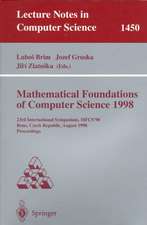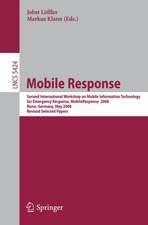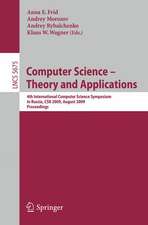Fuzzy Group Theory: Studies in Fuzziness and Soft Computing, cartea 182
Autor John N. Mordeson, Kiran R. Bhutani, A. Rosenfelden Limba Engleză Paperback – 21 oct 2010
| Toate formatele și edițiile | Preț | Express |
|---|---|---|
| Paperback (1) | 988.00 lei 43-57 zile | |
| Springer Berlin, Heidelberg – 21 oct 2010 | 988.00 lei 43-57 zile | |
| Hardback (1) | 994.58 lei 43-57 zile | |
| Springer Berlin, Heidelberg – 22 iun 2005 | 994.58 lei 43-57 zile |
Din seria Studies in Fuzziness and Soft Computing
- 20%
 Preț: 999.85 lei
Preț: 999.85 lei - 20%
 Preț: 653.06 lei
Preț: 653.06 lei - 20%
 Preț: 872.96 lei
Preț: 872.96 lei - 20%
 Preț: 930.57 lei
Preț: 930.57 lei - 20%
 Preț: 1051.00 lei
Preț: 1051.00 lei - 20%
 Preț: 992.44 lei
Preț: 992.44 lei - 20%
 Preț: 655.85 lei
Preț: 655.85 lei - 20%
 Preț: 1001.86 lei
Preț: 1001.86 lei - 18%
 Preț: 954.14 lei
Preț: 954.14 lei - 20%
 Preț: 330.10 lei
Preț: 330.10 lei - 20%
 Preț: 333.04 lei
Preț: 333.04 lei - 20%
 Preț: 997.56 lei
Preț: 997.56 lei -
 Preț: 391.61 lei
Preț: 391.61 lei - 20%
 Preț: 647.79 lei
Preț: 647.79 lei - 20%
 Preț: 986.01 lei
Preț: 986.01 lei - 18%
 Preț: 958.56 lei
Preț: 958.56 lei - 20%
 Preț: 996.40 lei
Preț: 996.40 lei - 20%
 Preț: 999.35 lei
Preț: 999.35 lei - 15%
 Preț: 646.43 lei
Preț: 646.43 lei - 20%
 Preț: 651.57 lei
Preț: 651.57 lei - 20%
 Preț: 997.89 lei
Preț: 997.89 lei - 15%
 Preț: 641.03 lei
Preț: 641.03 lei - 20%
 Preț: 1009.74 lei
Preț: 1009.74 lei - 20%
 Preț: 992.62 lei
Preț: 992.62 lei -
 Preț: 388.72 lei
Preț: 388.72 lei - 18%
 Preț: 1223.43 lei
Preț: 1223.43 lei - 20%
 Preț: 651.42 lei
Preț: 651.42 lei - 18%
 Preț: 951.59 lei
Preț: 951.59 lei - 18%
 Preț: 948.61 lei
Preț: 948.61 lei
Preț: 988.00 lei
Preț vechi: 1235.00 lei
-20% Nou
Puncte Express: 1482
Preț estimativ în valută:
189.06€ • 197.89$ • 157.35£
189.06€ • 197.89$ • 157.35£
Carte tipărită la comandă
Livrare economică 31 martie-14 aprilie
Preluare comenzi: 021 569.72.76
Specificații
ISBN-13: 9783642064128
ISBN-10: 3642064124
Pagini: 316
Ilustrații: XIV, 300 p.
Dimensiuni: 155 x 235 x 17 mm
Greutate: 0.45 kg
Ediția:Softcover reprint of hardcover 1st ed. 2005
Editura: Springer Berlin, Heidelberg
Colecția Springer
Seria Studies in Fuzziness and Soft Computing
Locul publicării:Berlin, Heidelberg, Germany
ISBN-10: 3642064124
Pagini: 316
Ilustrații: XIV, 300 p.
Dimensiuni: 155 x 235 x 17 mm
Greutate: 0.45 kg
Ediția:Softcover reprint of hardcover 1st ed. 2005
Editura: Springer Berlin, Heidelberg
Colecția Springer
Seria Studies in Fuzziness and Soft Computing
Locul publicării:Berlin, Heidelberg, Germany
Public țintă
ResearchCuprins
Fuzzy Subsets and Fuzzy Subgroups.- Fuzzy Caley's Theorem and Fuzzy Lagrange's Theorem.- Nilpotent, Commutator, and Solvable Fuzzy Subgroups.- Characterization of Certain Groups and Fuzzy Subgroups.- Free Fuzzy Subgroups and Fuzzy Subgroup Presentations.- Fuzzy Subgroups of Abelian Groups.- Direct Products of Fuzzy Subgroups and Fuzzy Cyclic Subgroups.- Equivalence of Fuzzy Subgroups of Finite Abelian Groups.- Lattices of Fuzzy Subgroups.- Membership Functions From Similarity Relations.
Recenzii
From the reviews of the first edition:
"The purpose of this book is to present an up to date account of fuzzy subgroups of a group, it is the first book dedicated entirely to the rapidly growing field of fuzzy group theory. … The book represents a major contribution to the literature on fuzzy groups. It is indispensable for researchers in this field, but also highly suitable as textbook for students at the graduate level." (Xie Xiang-Yun, Zentralblatt MATH, Vol. 1082, 2006)
"The purpose of this book is to present an up to date account of fuzzy subgroups of a group, it is the first book dedicated entirely to the rapidly growing field of fuzzy group theory. … The book represents a major contribution to the literature on fuzzy groups. It is indispensable for researchers in this field, but also highly suitable as textbook for students at the graduate level." (Xie Xiang-Yun, Zentralblatt MATH, Vol. 1082, 2006)
Textul de pe ultima copertă
This book presents an up-to-date account of research in important topics of fuzzy group theory. The book concentrates on the theoretical aspects of fuzzy subgroups of a group. It also includes applications to some abstract recognition problems and to coding theory. The book begins with basic properties of fuzzy subgroups. The notions of ascending series and descending series of fuzzy subgroups are used to define nilpotency of a fuzzy subgroup. Fuzzy subgroups of Hamiltonian, solvable, P-Hall, and nilpotent groups are discussed. Construction of free fuzzy subgroups is determined. Numerical invariants of fuzzy subgroups of Abelian groups are developed. The problem in group theory of obtaining conditions under which a group can be expressed as a direct product of its normal subgroups is considered. The number of fuzzy subgroups (up to an equivalence relation) of certain finite Abelian groups is determined. Methods for deriving fuzzy theorems from crisp ones are presented and the embedding of lattices of fuzzy subgroups into lattices of crisp groups is discussed. Deriving membership functions from similarity relations is considered.
The material presented in this book makes it a good reference for graduate students and researchers working in fuzzy group theory.
The material presented in this book makes it a good reference for graduate students and researchers working in fuzzy group theory.
Caracteristici
Up-to-date account of research in important topics of fuzzy group theory Concentrates on the theoretical aspects of fuzzy subgroups of a group Good reference for graduate students and researchers working in fuzzy group theory






















